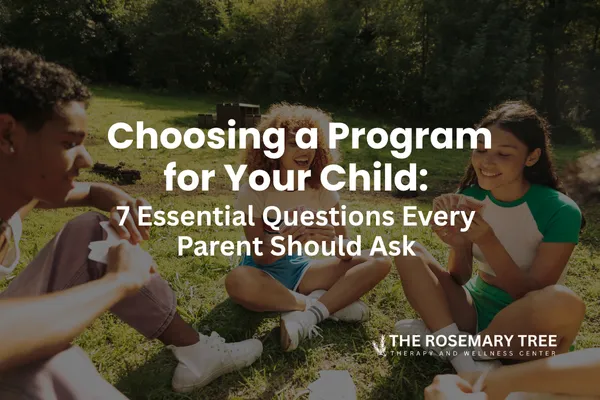
Choosing a Program for Your Child: 7 Essential Questions Every Parent Should Ask
Choosing a PHP or IOP for Your Child: 7 Essential Questions Every Parent Should Ask
Deciding on the right mental health program for your child can feel overwhelming. You want to ensure they receive the best care, but it's hard to know exactly what to look for or ask. To simplify the process, we’ve outlined seven important questions to guide your decision—along with insights into why each question matters.
1. What type of curriculum does your program use?
Why This Matters:
A structured curriculum indicates that the program is intentional and organized, not simply a series of random sessions. Asking this ensures your child is provided with consistent, evidence-based therapeutic skills and strategies throughout their treatment.
2. Who leads the program and interacts directly with my child?
Why This Matters:
Knowing the qualifications of the individuals working with your child daily helps you gauge the quality of care. Programs may be led by licensed therapists, associate-level therapists, interns, or behavioral health technicians (BHTs). Clarifying this can help ensure your child receives professional, skilled, and appropriate care for their specific needs.
3. What kind of family involvement does your program expect?
Why This Matters:
Mental health progress is enhanced when families participate actively. By asking about expected family involvement, you’ll discover how frequently you need to attend sessions or meetings, how progress updates are provided, and how the program supports you in growing alongside your child. This ensures you're prepared and aware of your critical role in your child’s treatment journey.
4. How long is your program and what outcomes can we expect?
Why This Matters:
Program length and anticipated outcomes directly influence your child's progress. Shorter or longer programs may suit different needs. Understanding outcomes helps you set realistic expectations and ensures the program is focused on achieving lasting, meaningful improvement—not just temporary relief.
5. What does your discharge and aftercare planning look like?
Why This Matters:
Discharge isn't the end of the treatment journey. Good programs provide comprehensive aftercare plans that guide your child's transition from structured support back into everyday life. A clear, thoughtful aftercare plan significantly increases the likelihood of ongoing success and reduces the chances of needing additional intensive care later.
6. How many kids are in each group?
Why This Matters:
Group size directly affects how much individual attention and support your child receives. Smaller groups typically allow for deeper connections, individualized guidance, and focused interactions. Larger groups offer more social interaction but might reduce personalized attention. Understanding the program’s group size helps you find the best balance for your child’s comfort and growth.
7. What are the primary diagnoses addressed within your groups?
Why This Matters:
Different diagnoses require unique therapeutic approaches. For example, groups primarily addressing substance abuse will differ significantly from groups focused on anxiety or depression. Ensuring the group aligns with your child’s primary mental health concerns helps guarantee they receive targeted, appropriate support.
Trust Your Instinct and Ask Questions Freely
While these questions will guide your decision-making, remember that you’re the expert on your child. Your parental instinct and intuition are invaluable tools—trust them. Don’t hesitate to ask these questions and any others that arise; a reputable program will always welcome your curiosity and provide clarity.
If you'd like to talk more or visit our facility, The Rosemary Tree team would love to meet with you. Reach out here—we’re here to help every step of the way.


